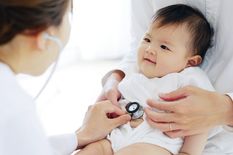Here’s a guide on when to seek emergency care for your baby:
- Changes in appetite
If your baby refuses several feedings in a row or eats poorly. - Changes in behaviour
If your baby is hard to awaken, unusually sleepy, or crying more than usual. - Tender navel or pelvis
If your baby’s umbilical area or penis suddenly becomes red or starts to ooze or bleed. - Fever
Baby younger than 3 months old: Any sign of fever.
Baby age 3-6 months old: Temperature up to 38.9°C or higher.
Baby age 6-24 months old: Temperature higher than 38.9°C that lasted more than one day. - Diarrhoea
If your baby’s stools are especially loose or watery. - Vomiting
Occasional spitting up, the easy flow of baby’s stomach contents through his or her mouth is normal. Vomiting is when the spitting flow is more forceful and is not as natural as dribbling from the mouth. Contact the doctor if your baby hasn’t been able to keep liquids down for eight hours. - Dehydration
If your baby cries with fewer tears, has significantly fewer wet diapers or has a dry mouth. Also, if your baby’s soft spot appears sunken. - Constipation
If your baby has fewer bowel movements than usual for a few days and appears to be struggling or uncomfortable. - Colds
If your baby has a cold that interferes with his or her breathing, has nasal mucus that lasts longer than 10-14 days, has ear pain or has a cough that lasts more than one week. - Rash
If a rash appears infected or if your baby suddenly develops an unexplained rash. - Eye discharge
If one or both eyes are red or leaking mucus.
Get in touch with your baby’s paediatrician as soon as possible for immediate care and consultation, when your baby shows the above symptoms.
